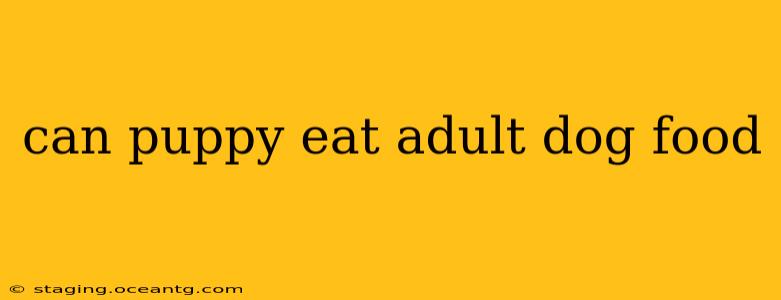Can Puppies Eat Adult Dog Food? A Comprehensive Guide for Puppy Owners
The short answer is: no, puppies generally shouldn't eat adult dog food. While it might seem like a convenient solution, feeding your puppy adult dog food can have several negative consequences for their health and development. This article delves into the reasons why, exploring the nutritional differences and potential risks. We'll also address some common questions surrounding puppy nutrition.
Why is Adult Dog Food Different from Puppy Food?
The key difference lies in the nutritional content. Puppies are growing rapidly and require a diet significantly higher in calories, protein, fat, and essential nutrients like calcium and phosphorus. These are crucial for building strong bones, muscles, and a healthy immune system. Adult dog food, designed for slower metabolisms and maintenance, simply doesn't provide the necessary levels.
What Happens if a Puppy Eats Adult Dog Food?
Feeding your puppy adult dog food can lead to several problems, including:
- Slowed Growth: Insufficient calories and essential nutrients can result in stunted growth and underdeveloped bones.
- Nutritional Deficiencies: A lack of specific vitamins and minerals can lead to various health issues, including weakened immunity, skeletal problems, and skin conditions.
- Digestive Issues: The different composition of adult food can cause digestive upset, such as diarrhea or vomiting.
- Kidney and Liver Strain: Adult food may contain higher levels of certain components, potentially overworking the puppy's still-developing organs.
How Much Protein and Fat Do Puppies Need?
Puppies need significantly higher levels of protein and fat compared to adult dogs. The exact amounts vary based on breed, size, and age, but generally, puppy food contains a higher percentage of these macronutrients to fuel their rapid growth. Always consult your veterinarian or refer to the feeding guidelines on your puppy food packaging.
What are the Best Puppy Foods?
Choosing the right puppy food is crucial. Look for high-quality brands that clearly list their ingredients and nutritional information. Avoid foods with excessive fillers or artificial ingredients. Consider factors like your puppy's breed size (small, medium, or large breed formulas are often available) and any specific dietary needs or sensitivities. Again, a veterinarian's recommendation is invaluable.
Can I Give My Puppy a Little Adult Dog Food as a Treat?
While occasional small amounts of adult dog food are unlikely to cause serious harm, it’s best to avoid it altogether. Instead, opt for puppy-specific treats designed for their nutritional needs. These are available in various flavors and textures to keep your puppy engaged and happy.
When Can I Switch My Puppy to Adult Dog Food?
The transition to adult dog food should be gradual and ideally occur after your puppy has reached its full adult size and the veterinarian approves. The timing varies depending on breed; consult your vet for personalized guidance. A sudden switch can still cause digestive upset.
My Puppy Accidentally Ate Adult Dog Food, What Should I Do?
If your puppy has accidentally ingested a small amount of adult dog food, monitor them closely for any signs of digestive upset (vomiting, diarrhea, lethargy). If you notice any concerning symptoms, contact your veterinarian immediately.
In conclusion, while it may seem tempting to save money or utilize leftover adult dog food, it's critical to prioritize your puppy's health and growth by providing them with a nutritionally complete and balanced puppy food formulated specifically for their developmental needs. Always consult your veterinarian for personalized dietary advice.
